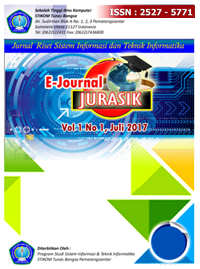Penerapan Algoritma Apriori Dalam Memprediksi Hasil Penjualan Sparepart PC (Studi Kasus : Toko Sentra Computer)
Abstract
Full Text:
PDFReferences
Abdillah, G., Putra, F. A. and Renaldi, F. (2016) ‘Penerapan Data Mining Pemakaian Air Pelanggan Untuk Menentukan Klasifikasi Potensi Pemakaian Air Pelanggan Baru Di PDAM TIRTA RAHARJA Menggunakan Algoritma K-Means’, Seminar Nasional Teknologi Informasi dan Komunikasi 2017 (Sentika 2016), pp. 498–506.
Badrul, M. (2016) ‘Algoritma Asosiasi Dengan Algoritma Apriori Untuk Analisa Data Penjualan’, Jurnal Pilar Nusa Mandiri, 11(2), pp. 121–129.
M. G. Sadewo, A. P. Windarto, and A. Wanto, “Penerapan Algoritma Clustering dalam Mengelompokkan Banyaknya Desa/Kelurahan Menurut Upaya Antisipasi/ Mitigasi Bencana Alam Menurut Provinsi dengan K-Means,” KOMIK (Konferensi Nasional Teknologi Informasi dan Komputer), vol. 2, no. 1, pp. 311–319, 2018
R. W. Sari, A. Wanto, and A. P. Windarto, “Implementasi Rapidminer dengan Metode K-Means (Study Kasus : Imunisasi Campak pada Balita Berdasarkan Provinsi),” KOMIK (Konferensi Nasional Teknologi Informasi dan Komputer), vol. 2, no. 1, pp. 224–230, 2018.
S. Sudirman, A. P. Windarto, and A. Wanto, “Data Mining Tools | RapidMiner : K-Means Method on Clustering of Rice Crops by Province as Efforts to Stabilize Food Crops In Indonesia,” IOP Conference Series: Materials Science and Engineering, vol. 420, no. 12089, pp. 1–8, 2018
I. Parlina, A. P. Windarto, A. Wanto, and M. R. Lubis, “Memanfaatkan Algoritma K-Means dalam Menentukan Pegawai yang Layak Mengikuti Asessment Center untuk Clustering Program SDP,” CESS (Journal of Computer Engineering System and Science), vol. 3, no. 1, pp. 87–93, 2018
Sulastri, H. and Gufroni, A. I. (2017) ‘Penerapan Data Mining Dalam Pengelompokan Penderita THALASSAEMIA’, Jurnal Teknologi dan Sistem Informasi, 3(2), pp. 299–305.
Srikanti, E. et al. (2018) ‘Penerapan Algoritma Apriori Untuk Mencari Aturan Asosiasi Pada Data Peminjaman Buku Di Perpustakaan’, Jurnal Ilmiah Rekayasa dan Manajemen Sistem Informasi, 4(1), pp. 77–80.
Ummi, K. (2015) ‘Analisa Data Mining Dalam Penjualan Sparepart Mobil Dengan Menggunakan Metode Algoritma Apriori’, CRSID Journal, 8(3), pp. 155–164.
Nursikuwagus, A. and Hartono, T. (2016) ‘Implementasi Algoritma Apriori Untuk Analisis Penjualan Dengan Berbasis WEB’, Junal SIMETRIS, 7(2), pp. 701–706.
Haryati, S., Sudarsono, A. and Suryana, E. (2015) ‘Implementasi Data Mining Untuk Memprediksi Masa Studi Mahasiswa Menggunakan Algoritma C4.5’, Jurnal Media Informasi, 11(2), pp. 130–138.
DOI: http://dx.doi.org/10.30645/senaris.v1i0.99
Refbacks
- There are currently no refbacks.
 








